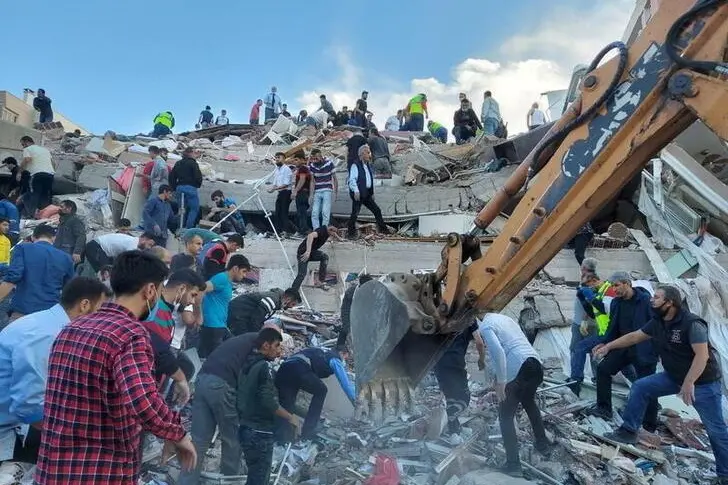PHOTO
IZMIR, Turkey - Nineteen people were killed in Turkey and Greece after a strong earthquake struck the Aegean Sea on Friday, bringing buildings crashing down and setting off tidal waves which slammed into coastal areas and islands.
People ran onto streets in panic in the Turkish city of Izmir, witnesses said, after the quake struck with a magnitude of up to 7.0. Neighbourhoods were deluged with surging seawater which swept debris inland and left fish stranded as it receded.
Turkey's Disaster and Emergency Management Presidency (AFAD) said 17 people died, one due to drowning, while 709 people were injured. On the Greek island of Samos two teenagers, a boy and a girl, were found dead in an area where a wall had collapsed.
Search and rescue operations continued at 17 collapsed or damaged buildings in Izmir, AFAD said. Authorities were setting up tents with a total capacity of 2,000 people near areas with the highest damage, Urbanisation Minister Murat Kurum said.
Ilke Cide, a doctoral student who was in Izmir's Guzelbahce region during the earthquake, said he went inland after waters rose following the earthquake.
"I am very used to earthquakes ... so I didn't take it very seriously at first but this time it was really scary," he said, adding the earthquake had lasted for at least 25-30 seconds.
Crisscrossed by major fault lines, Turkey is among the most earthquake-prone countries in the world. More than 17,000 people were killed in August 1999 when a 7.6 magnitude quake struck Izmit, a city southeast of Istanbul. In 2011, a quake in the eastern city of Van killed more than 500.
FLOODING
Ismail Yetiskin, mayor of Izmir's Seferihisar, said sea levels rose as a result of the quake. "There seems to be a small tsunami," he told broadcaster NTV.
Footage on social media showed debris including refrigerators, chairs and tables floating through streets on the deluge. TRT Haber showed cars in Izmir's Seferihisar district had been dragged by the water and piled on top of each other.
Idil Gungor, who runs a hotel in Izmir's Seferihisar district, told broadcaster NTV that people were cleaning the debris after the floodwaters receded. She said fish had washed up on the garden of the hotel, around 50 metres (55 yards)from the shore.
Residents of the Greek island of Samos, which has a population of about 45,000, were urged to stay away from coastal areas, Eftyhmios Lekkas, head of Greece's organisation for anti-seismic planning, told Greece's Skai TV.
"It was a very big earthquake, it's difficult to have a bigger one," said Lekkas.
High tidal wave warnings were in place in Samos, where eight people were also injured, according to a Greek official.
"We have never experienced anything like it," said George Dionysiou, the local vice-mayor. "People are panicking." A Greek police spokesman said there was damage to some old buildings on the island.
The leaders of Turkey and Greece - caught up in a bitter dispute over exploration rights in the eastern Mediterranean - spoke by phone and expressed hopes that both countries would see a speedy recovery from the quake, Turkey's presidency said.
Both leaders said they were ready to help the other country if needed and emphasised the importance of solidarity.
"Whatever our differences, these are times when our people need to stand together," Greek Prime Minister Kyriakos Mitsotakis wrote in a tweet.
"That two neighbors show solidarity in difficult times is more valuable than many things in life," Turkish President Tayyip Erdogan wrote in a tweet responding to Mistotakis.
Cooperation between the two countries after the devastating 1999 earthquake led to a period of warmer ties between them.
AFAD put the magnitude of the earthquake at 6.6, while the U.S. Geological Survey said it was 7.0. It was felt along Turkey's Aegean coast and the northwestern Marmara region, media said.
(Reporting by Ali Kucukgocmen and Ece Toksabay; Additional reporting by Renee Maltezou, Angeliki Koutantou and Michele Kambas; Editing by Ezgi Erkoyun, Dominic Evans, Jon Boyle, Susan Fenton, Emelia Sithole-Matarise and Jonathan Oatis) ((ali.kucukgocmen@thomsonreuters.com , @alikucukgocmen; +902123507067; Reuters Messaging: Reuters Messaging: ali.kucukgocmen.thomsonreuters.com@reuters.net))





















